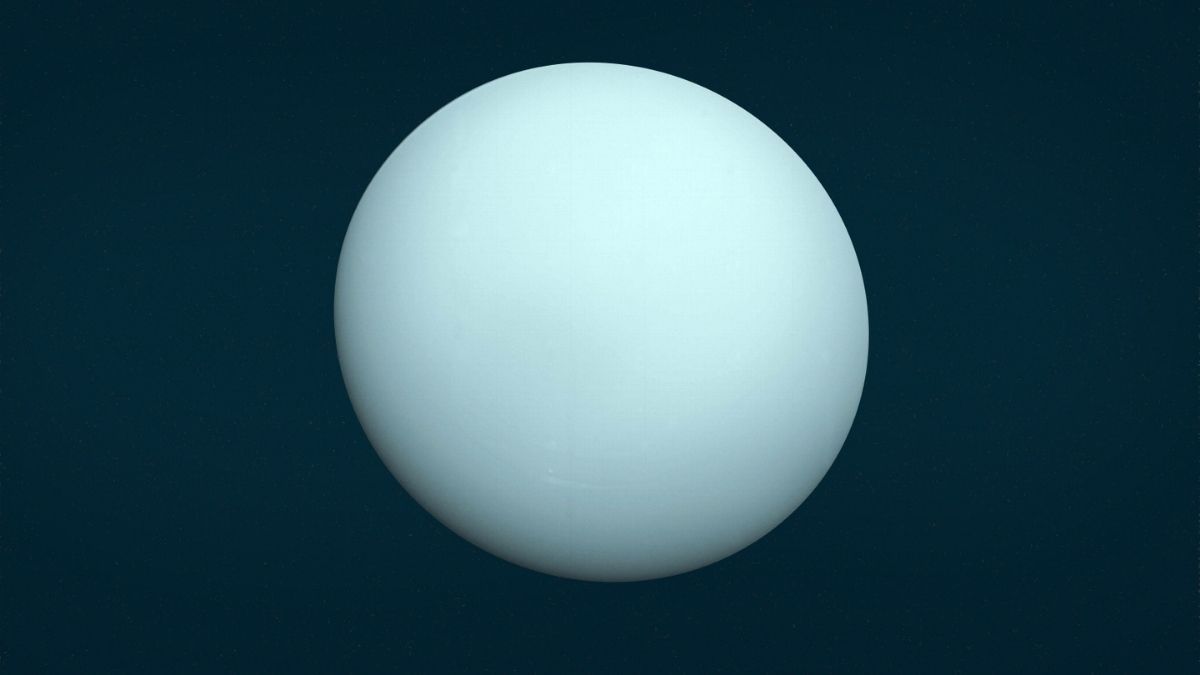A 2018 study found hydrogen sulfide, a gas that smells like rotten eggs or farts, in Uranus' cloud deck. Unfortunately (or perhaps fortunately), no human has ever actually smelled Uranus, and the odor is likely not as odorous as the statement "Uranus smells like farts" implies.
On June 14, 2021, after a non-sequitur tweet about the lengths of planetary orbits by billionaire entrepreneur Elon Musk caused the name "Uranus" to start trending on social media, the UberFacts Twitter account posted a message that many people assumed was a somewhat childish joke at the expense of the planet's name (Uranus sounds like "your anus"). The Twitter account claimed that Uranus smells like farts:
Surprisingly, this is not a joke.
This funny fact first surfaced in 2018 after a study about the gas giant was published in Nature Astronomy. The lead author of the study, Patrick Irwin, a Professor of Planetary Physics at Oxford University, and his colleagues studied Uranus' atmosphere with the Gemini North telescope in Hawaii and its Near-Infrared Integral Field Spectrometer (NIFS), and found the signature of hydrogen sulfide in the planet's cloud deck. If you've ever been around this colorless gas, you probably know that it smells like rotten eggs or flatulence. That means that if a human ever had a chance to smell Uranus, they'd probably remark that it smelled like farts.
Space.com reported:
There's a lot of really smelly stuff wafting around Uranus.
The clouds in Uranus' upper atmosphere are composed largely of hydrogen sulfide, the molecule that makes rotten eggs so stinky, a new study suggests...
Researchers have long wondered about the composition of the clouds high up in Uranus' sky — specifically, whether they're dominated by ammonia ice, as at Jupiter and Saturn, or by hydrogen sulfide ice. The answer has proved elusive, because it's tough to make observations with the required detail on distant Uranus...
Irwin and his colleagues studied Uranus' air using the Near-Infrared Integral Field Spectrometer (NIFS), an instrument on the 26-foot (8 meters) Gemini North telescope in Hawaii. NIFS scrutinized sunlight reflected from the atmosphere just above Uranus' cloud tops — and spotted the signature of hydrogen sulfide.
A press release from the Gemini Observatory explains the importance of this discovery. And no, it's not so future astronauts can avoid offensive planetary smells:
Hydrogen sulfide, the gas that gives rotten eggs their distinctive odor, permeates the upper atmosphere of the planet Uranus – as has been long debated, but never definitively proven. Based on sensitive spectroscopic observations with the Gemini North telescope, astronomers uncovered the noxious gas swirling high in the giant planet’s cloud tops. This result resolves a stubborn, long-standing mystery of one of our neighbors in space ...
The detection of hydrogen sulfide high in Uranus’s cloud deck (and presumably Neptune’s) contrasts sharply with the inner gas giant planets, Jupiter and Saturn, where no hydrogen sulfide is seen above the clouds, but instead ammonia is observed. The bulk of Jupiter and Saturn’s upper clouds are comprised of ammonia ice, but it seems this is not the case for Uranus. These differences in atmospheric composition shed light on questions about the planets’ formation and history.
Leigh Fletcher, a member of the research team from the University of Leicester in the UK, adds that the differences between the cloud decks of the gas giants (Jupiter and Saturn), and the ice giants (Uranus and Neptune), were likely imprinted way back during the birth of these worlds. “During our Solar System’s formation the balance between nitrogen and sulphur (and hence ammonia and Uranus’s newly-detected hydrogen sulfide) was determined by the temperature and location of planet’s formation.”
Another factor in the early formation of Uranus is the strong evidence that our Solar System’s giant planets likely migrated from where they initially formed. Therefore, confirming this composition information is invaluable in understanding Uranus’ birthplace, evolution and refining models of planetary migrations.
While this discovery is important in terms of understanding the formation of the planets, it's the smell of Uranus that proved to be the study's most popular point. Unfortunately, or perhaps fortunately, humans will probably never be able to take in a whiff of Uranus' smelly, fart-filled atmosphere.
Irwin said that if a human ever did find themselves on Uranus, they would probably die of suffocation, or from the planet's negative 400 degree Fahrenheit atmosphere, before they ever got a chance to smell the planet:
While the results set a lower limit to the amount of hydrogen sulfide around Uranus, it is interesting to speculate what the effects would be on humans even at these concentrations. “If an unfortunate human were ever to descend through Uranus’s clouds, they would be met with very unpleasant and odiferous conditions.” But the foul stench wouldn’t be the worst of it according to Irwin. “Suffocation and exposure in the negative 200 degrees Celsius atmosphere made of mostly hydrogen, helium, and methane would take its toll long before the smell,” concludes Irwin.
Astronomer Phil Plait also noted that Uranus probably only smells like farts "a little" because the hydrogen sulfide in the planet's clouds is frozen.
In short, it would be more accurate (but less funny), to say that hydrogen sulfide, a gas that smells like rotten eggs, has been found in Uranus' atmosphere. While there is probably a fart-like smell to the planet, it's not clear how prevalent this odor would be, and humans will probably never get a chance to actually smell it.


